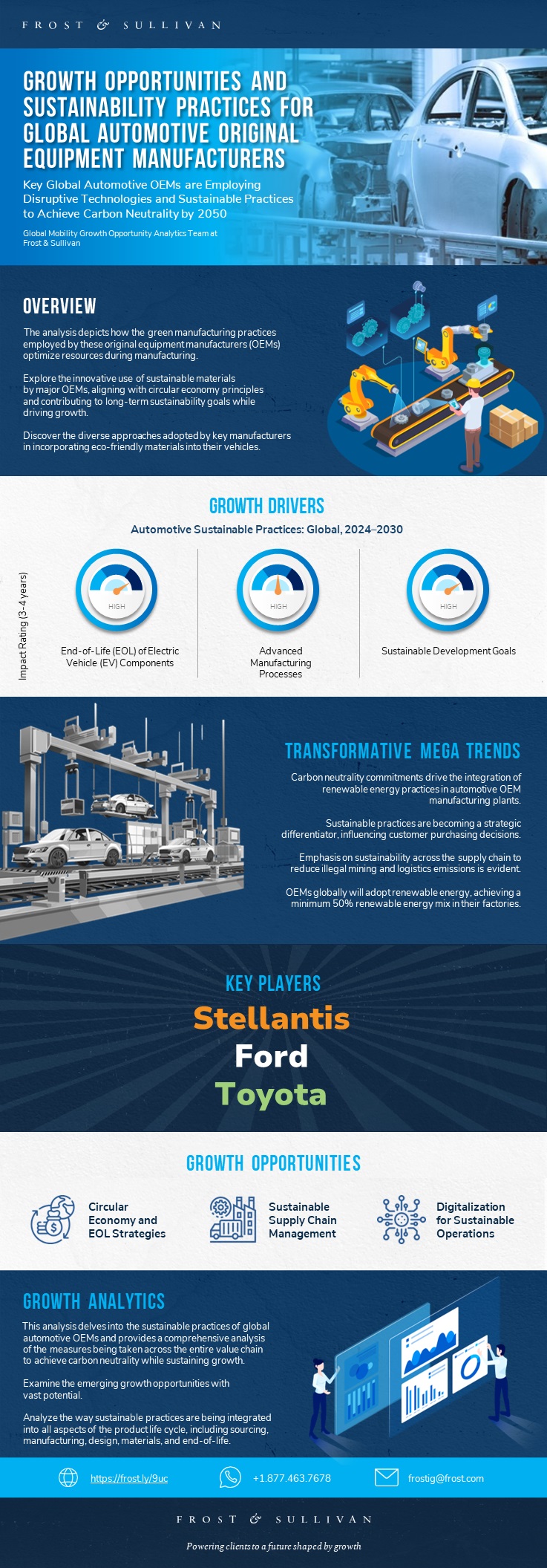Global Automotive OEMs Sustainability Practices
Global Automotive OEMs Sustainability Practices
Key Global Automotive OEMs are Employing Disruptive Technologies and Sustainable Practices to Achieve Carbon Neutrality by 2050
19-Dec-2023
Global
Market Research
Description
This report delves into the sustainable practices of 9 global automotive original equipment manufacturers (OEMs), providing a comprehensive analysis of the measures being taken across the entire value chain to achieve carbon neutrality by 2025. The study examines the way sustainable practices are being integrated into all aspects of the product life cycle, including sourcing, manufacturing, design, materials, and end-of-life. It reveals the degree to which OEMs prioritize sustainable sourcing in their supply chains, emphasizing resilience and ethical standards.
The study depicts how the green manufacturing practices employed by these OEMs contribute to reducing carbon footprints and optimizing resources during the manufacturing stage. Striking a balance between environmental consciousness and manufacturing efficiency, the study considers both short-term costs and long-term impacts, as well as the complexities of implementation. The report highlights the innovative use of sustainable materials by the 9 OEMs, aligning with circular economy principles and contributing to long-term sustainability goals. It showcases the diverse approaches adopted by these manufacturers in incorporating eco-friendly materials into their vehicles. Furthermore, the report sheds light on how these OEMs manage the environmental impact of end-of-life vehicle disposal, remanufacturing, and reuse activities. It details innovative practices such as parts remanufacturing, various recycling methods, and recent achievements in end-of-life activities. The study provides a nuanced understanding of how these automotive giants are navigating the intersection of sustainability and industry efficiency across their operations.
RESEARCH: INFOGRAPHIC
This infographic presents a brief overview of the research, and highlights the key topics discussed in it.Click image to view it in full size

Table of Contents
Why Is It Increasingly Difficult to Grow?
The Strategic Imperative 8™
The Impact of the Top 3 Strategic Imperatives on the Automotive Sustainable Practices Industry
Growth Opportunities Fuel the Growth Pipeline Engine™
Scope of Analysis
Key Competitors
Growth Drivers
Growth Restraints
Key Takeaways
Automotive Brands and Their Sustainability Roadmaps
Automotive Brands and Their Sustainability Roadmaps (continued)
Automotive Sustainability Practices Segmentation
Sustainability Overview: Stellantis Group
Stellantis Sustainability Developments and Partnership Ecosystem
Sustainable Raw Material Sourcing: Stellantis
Sustainable Supply Chain: Stellantis
Sustainable Design and Manufacturing: Stellantis
Sustainable Material Usage Overview: Stellantis
Recycling and EOL Practices: Stellantis
Sustainability Overview: Ford
Ford Sustainability Developments and Partnership Ecosystem
Sustainable Raw Material Sourcing: Ford
Sustainable Supply Chain: Ford
Sustainable Design and Manufacturing: Ford
Sustainable Material Usage Overview: Ford
Recycling and EOL Practices: Ford
Sustainability Overview: GM
GM Sustainability Developments and Partnership Ecosystem
Sustainable Raw Material Sourcing: GM
Sustainable Supply Chain: GM
Sustainable Design and Manufacturing: GM
Sustainable Material Usage Overview: GM
Recycling and EOL Practices: GM
Sustainability Overview: Hyundai & Kia
Hyundai & Kia Sustainability Developments and Partnership Ecosystem
Sustainable Raw Material Sourcing: Hyundai & Kia
Sustainable Supply Chain: Hyundai & Kia
Sustainable Design and Manufacturing: Hyundai & Kia
Sustainable Material Usage Overview: Hyundai & Kia
Recycling and EOL Practices: Hyundai & Kia
Sustainability Overview: Mercedes-Benz
Mercedes-Benz Sustainability Developments and Partnership Ecosystem
Sustainable Raw Material Sourcing: Mercedes-Benz
Sustainable Supply Chain: Mercedes-Benz
Sustainable Design and Manufacturing: Mercedes-Benz
Sustainable Material Usage Overview: Mercedes-Benz
Recycling and EOL Practices: Mercedes-Benz
Sustainability Overview: Nissan
Nissan Sustainability Developments and Partnership Ecosystem
Sustainable Raw Material Sourcing: Nissan
Sustainable Supply Chain: Nissan
Sustainable Design and Manufacturing: Nissan
Sustainable Material Usage Overview: Nissan
Recycling and EOL Practices: Nissan
Sustainability Overview: Renault
Renault Sustainability Developments and Partnership Ecosystem
Sustainable Raw Material Sourcing: Renault
Sustainable Supply Chain: Renault
Sustainable Design and Manufacturing: Renault
Sustainable Material Usage Overview: Renault
Recycling and EOL Practices: Renault
Sustainability Overview: Toyota
Toyota Sustainability Developments and Partnership Ecosystem
Sustainable Raw Material Sourcing: Toyota
Sustainable Supply Chain: Toyota
Sustainable Design and Manufacturing: Toyota
Sustainable Material Usage Overview: Toyota
Recycling and EOL Practices: Toyota
Sustainability Overview: VW
VW Sustainability Developments and Partnership Ecosystem
Sustainable Raw Material Sourcing: VW
Sustainable Supply Chain: VW
Sustainable Design and Manufacturing: VW
Sustainable Material Usage Overview: VW
Recycling and EOL Practices: VW
Growth Opportunity 1: Circular Economy and EOL Strategies
Growth Opportunity 1: Circular Economy and EOL Strategies (continued)
Growth Opportunity 2: Sustainable Supply Chain Management
Growth Opportunity 2: Sustainable Supply Chain Management (continued)
Growth Opportunity 3: Digitalization for Sustainable Operations
Growth Opportunity 3: Digitalization for Sustainable Operations (continued)
Your Next Steps
Why Frost, Why Now?
List of Exhibits
Legal Disclaimer
Popular Topics
| Deliverable Type | Market Research |
|---|---|
| Author | Thanigesh Arumugam Parthasarathi |
| Industries | Automotive |
| No Index | No |
| Is Prebook | No |
| Keyword 1 | Automotive OEMs |
| Keyword 2 | Automotive Sustainability |
| Keyword 3 | Sustainable Manufacturing |
| Podcast | No |
| WIP Number | PF98-01-00-00-00 |